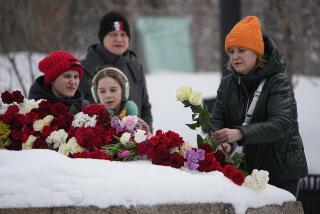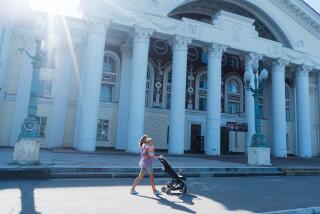Brezhnev Takes New Blow as City Drops His Name
- Share via
MOSCOW — The late Soviet leader Leonid I. Brezhnev, who ruled this country for 18 years, was pushed closer to political obscurity Wednesday by the Communist Party Central Committee and the Soviet government.
Brezhnev’s name was removed from a city, a district in Moscow and squares in Leningrad and Moscow, symbolizing his public disgrace.
Since Mikhail S. Gorbachev assumed power in the spring of 1985, Brezhnev’s star has been waning. He was accused of fostering social and economic “stagnation” during the late 1970s and early 1980s.
After he died of a heart attack in November, 1982, the city of Naberezhnye Chelny in the Tatar Autonomous Republic was renamed Brezhnev in his honor. The historic district of Cheryomushki in Moscow was also renamed for Brezhnev and so was the Red Guard Square in Leningrad and a new square in Moscow.
At the time of his death, the official Tass news agency reported that the name changes were made to perpetuate Brezhnev’s memory, eulogizing him as “a true continuer” of the cause of Vladimir I. Lenin, the founder of the Soviet state.
Also named for Brezhnev were an atomic icebreaker, a naval vessel, a passenger liner, an army tank division, a metallurgical institute, a military academy, a dam and a nuclear reactor plant. It was not immediately clear if the Brezhnev name would be removed from those structures as well.
Leaders in Disfavor
The posthumous honors suddenly stripped away Wednesday provided another example of the Soviet tendency to switch names once their owners have fallen into disfavor. For example, Stalingrad, named for Soviet dictator Josef Stalin, who died in 1953, was renamed Volgograd after disclosure of his crimes by the late Soviet leader Nikita S. Khrushchev.
Khrushchev himself became a non-person after he was toppled from power in 1964, and his name was almost never mentioned in official documents. It was only last year that the cemetery where Khrushchev is buried was re-opened for the general public. His face has once again been seen on television screens, and favorable articles about him have appeared in the party-controlled press.
Very few, if any, kind words about Brezhnev have been uttered since Gorbachev took power. The blame for the Soviet Union’s economic malaise and a rise in corruption were laid at his door by Gorbachev and his allies at the 27th Party Congress early in 1986.
Response to Plans
In reporting the renaming, Tass said the party’s Central Committee and the Presidium of the Supreme Soviet responded to proposals by the public to erase Brezhnev’s honors.
It was reported in an article last September in the weekly magazine Ogonyok that dozens of residents of the city of Brezhnev had urged a return to the city’s old name in letters written to local party officials. “Many consider it quite unjustified that their native city, their Naberezhnye Chelny, carries the name of the former leader of the country who never visited . . , a man whose name is tied to ‘the epoch of decay,’ ” the magazine said.
For several years before his death in 1982, Brezhnev was a pathetic figure, barely able to walk or speak, who made it a habit to award himself new honors and medals. He did, however, achieve a degree of popularity within the Communist Party Establishment by not interfering with the status quo or the increasing perquisites of party officials.
Ever since Stalin sent Leon Trotsky into exile and banned his name from the history books, obliterating reminders of the past has been a frequent practice in the Soviet Union. The removal of Brezhnev’s name from a city, a district and two squares is only the latest outward sign of this tendency.
More to Read
Sign up for Essential California
The most important California stories and recommendations in your inbox every morning.
You may occasionally receive promotional content from the Los Angeles Times.













